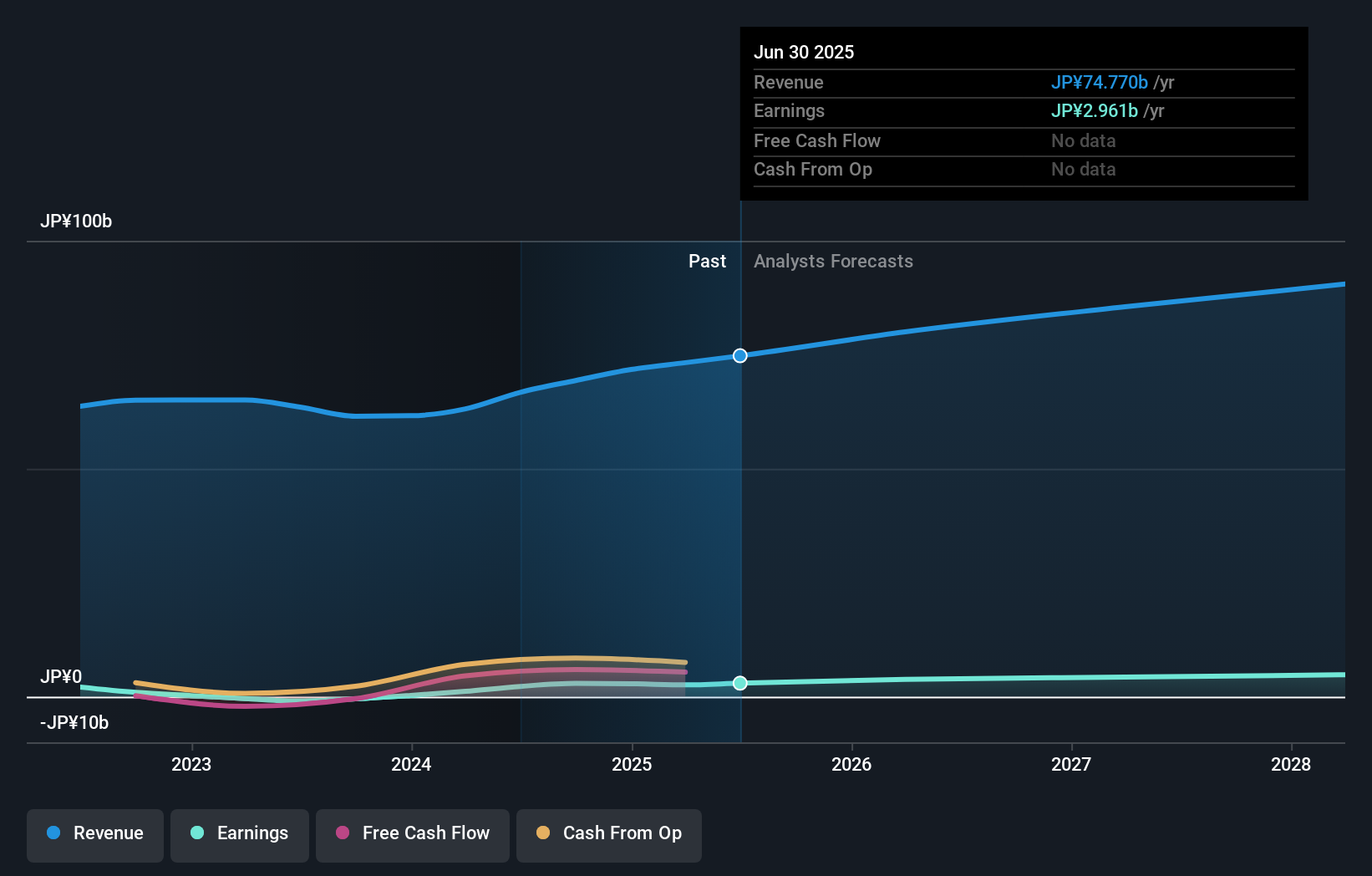Retail investors who hold 48% of DKS Co. Ltd. (TSE:4461) gained 16%, institutions profited as well
Key Insights
- DKS' significant retail investors ownership suggests that the key decisions are influenced by shareholders from the larger public
- A total of 19 investors have a majority stake in the company with 50% ownership
- 44% of DKS is held by Institutions
To get a sense of who is truly in control of DKS Co. Ltd. (TSE:4461), it is important to understand the ownership structure of the business. The group holding the most number of shares in the company, around 48% to be precise, is retail investors. Put another way, the group faces the maximum upside potential (or downside risk).
Retail investors gained the most after market cap touched JP¥67b last week, while institutions who own 44% also benefitted.
In the chart below, we zoom in on the different ownership groups of DKS.
See our latest analysis for DKS

What Does The Institutional Ownership Tell Us About DKS?
Many institutions measure their performance against an index that approximates the local market. So they usually pay more attention to companies that are included in major indices.
We can see that DKS does have institutional investors; and they hold a good portion of the company's stock. This suggests some credibility amongst professional investors. But we can't rely on that fact alone since institutions make bad investments sometimes, just like everyone does. It is not uncommon to see a big share price drop if two large institutional investors try to sell out of a stock at the same time. So it is worth checking the past earnings trajectory of DKS, (below). Of course, keep in mind that there are other factors to consider, too.

DKS is not owned by hedge funds. Sumitomo Mitsui DS Asset Management Company, Limited is currently the largest shareholder, with 6.5% of shares outstanding. With 5.8% and 4.4% of the shares outstanding respectively, Dai-ichi Life Holdings, Inc. and Kyoto Financial Group,Inc. are the second and third largest shareholders.
After doing some more digging, we found that the top 19 have the combined ownership of 50% in the company, suggesting that no single shareholder has significant control over the company.
While studying institutional ownership for a company can add value to your research, it is also a good practice to research analyst recommendations to get a deeper understand of a stock's expected performance. While there is some analyst coverage, the company is probably not widely covered. So it could gain more attention, down the track.
Insider Ownership Of DKS
The definition of an insider can differ slightly between different countries, but members of the board of directors always count. Management ultimately answers to the board. However, it is not uncommon for managers to be executive board members, especially if they are a founder or the CEO.
I generally consider insider ownership to be a good thing. However, on some occasions it makes it more difficult for other shareholders to hold the board accountable for decisions.
We can see that insiders own shares in DKS Co. Ltd.. As individuals, the insiders collectively own JP¥683m worth of the JP¥67b company. This shows at least some alignment. You can click here to see if those insiders have been buying or selling.
General Public Ownership
With a 48% ownership, the general public, mostly comprising of individual investors, have some degree of sway over DKS. While this group can't necessarily call the shots, it can certainly have a real influence on how the company is run.
Next Steps:
I find it very interesting to look at who exactly owns a company. But to truly gain insight, we need to consider other information, too. Consider risks, for instance. Every company has them, and we've spotted 1 warning sign for DKS you should know about.
If you are like me, you may want to think about whether this company will grow or shrink. Luckily, you can check this free report showing analyst forecasts for its future.
NB: Figures in this article are calculated using data from the last twelve months, which refer to the 12-month period ending on the last date of the month the financial statement is dated. This may not be consistent with full year annual report figures.
New: Manage All Your Stock Portfolios in One Place
We've created the ultimate portfolio companion for stock investors, and it's free.
• Connect an unlimited number of Portfolios and see your total in one currency
• Be alerted to new Warning Signs or Risks via email or mobile
• Track the Fair Value of your stocks
Have feedback on this article? Concerned about the content? Get in touch with us directly. Alternatively, email editorial-team (at) simplywallst.com.
This article by Simply Wall St is general in nature. We provide commentary based on historical data and analyst forecasts only using an unbiased methodology and our articles are not intended to be financial advice. It does not constitute a recommendation to buy or sell any stock, and does not take account of your objectives, or your financial situation. We aim to bring you long-term focused analysis driven by fundamental data. Note that our analysis may not factor in the latest price-sensitive company announcements or qualitative material. Simply Wall St has no position in any stocks mentioned.
About TSE:4461
DKS
Engages in the production and sale of surfactants, other industrial chemicals, and life sciences-related products in Japan and internationally.
Flawless balance sheet with proven track record.
Market Insights
Community Narratives



